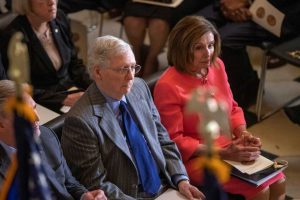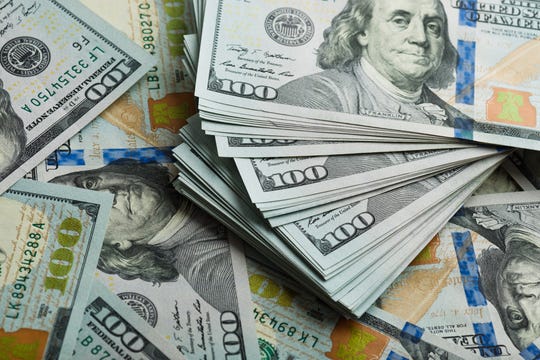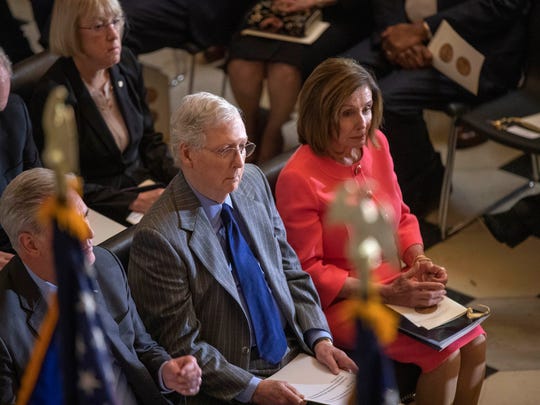Fact check: Facebook post off about U.S. millionaires, but close on wealthy members of Congress

The claim: Only 4% of Americans are millionaires compared with 51% of Congress
The U.S. is minting more millionaires every year, but the share of wealthy people in the general population is still dwarfed by the share of wealthy members of Congress.
A viral Facebook post from July 2019 that has found renewed life online tries to illustrate that point, but it misses the mark on a key detail.
The meme says only 4% of Americans are millionaires, compared with 51% of members of Congress, adding, “Remember this when a politician talks about income inequality.”
The claim was first posted on July 23, 2019, and it has been shared about 180,000 times as of June 8. But it saw a surge in activity almost two years later, with commenters debating its accuracy (and why public officials are disproportionately wealthy).
“True story,” one commenter responded.
Not so fast. While the Center for Responsive Politics estimates indeed show the majority of members of Congress have a net worth of more than $1 million, the post is off about the general population.
Fact check: Nadler, Pelosi and Schiff next up for reelection in 2022
The Facebook user who first shared the post did not respond to a request for comment.
Millionaires in the U.S.
Credit Suisse estimates that about 8% of American adults are millionaires. (Photo: Getty Images)
Credit Suisse publishes an annual report that analyzes, among other things, the number of millionaires across the world.
The U.S. had about 17.4 million of the globe’s 42.2 million millionaires in 2018, the report that would have been current at the time of the viral Facebook post.
At that time, the U.S. adult population was about 243 million, meaning about 7.2% of American adults were millionaires. If children are included as well, the U.S. population increases to 326 million in 2018; 5.3% would have been millionaires.
Under either calculation, the 4% cited in the 2019 Facebook post is off.
More recent data suggest the proportion of millionaires in the U.S. is even higher, though the specifics vary by source.
Credit Suisse’s 2020 update said about 8% of U.S. adults are millionaires. The U.S. Census Bureau said in a 2020 report that more than 10% of households had wealth of more than $1 million in 2017. Financial services researchers at Phoenix MI said about 6.7% of U.S. households were millionaires in 2019.
The user who shared the post did not respond to a request for additional evidence to support the claim.
Fact check: False claim says Biden’s American Families Plan would extend high school by 4 years
The 1996 book “The Millionaire Next Door” determined about 3.5% of the 100 million U.S. households at the time had a net worth of more than $1 million. That’s not the same figure in the Facebook meme, but it’s the closest estimate USA TODAY could find to what is asserted in the claim.
Congressional millionaires
House Speaker Nancy Pelosi and Senate Majority Leader Mitch McConnell join congressional leadership and other members of Congress at a Congressional Gold Medal ceremony in Statuary Hall on Capitol Hill on Jan. 15, 2020, in Washington. (Photo: The Associated Press)
Compared with the overall population, Congress is made up of a disproportionate share of millionaires. But determining the number of wealthy people in Congress is more complicated.
Members of the House of Representatives and the Senate are required to file financial disclosure forms that are publicly available, but they do not report a precise accounting of their wealth. Instead, they report the value of assets and liabilities in ranges.
Personal residences not held for investment purposes and some other large assets also don’t have to be disclosed.
Fact check: Rep. Alexandria Ocasio-Cortez’s net worth is not close to $1 million
The Center for Responsive Politics compiles those reports in a list to determine the wealthiest members of Congress, based on the average between the high- and low-end estimates of their net worth.
The group estimated 229 members were millionaires out of 433 in 2018, the most recent year for which OpenSecrets has compiled the data. In 2017, 273 out of 520 had an average net worth of more than $1 million, its data show.
That works out to about 52% — slightly off from the 51% in the Facebook meme, but close.
Fact check: No, House Speaker Nancy Pelosi isn’t worth $196 million
Sen. Mark Warner, D-Va., was the wealthiest member of Congress in 2018 with an average of $214 million to his name, according to OpenSecrets. House Speaker Nancy Pelosi, D-Calif., ranked No. 7, and Senate Minority Leader Mitch McConnell, R-Ky., ranked 21st in the 2018 data.
Our rating: Partly false
The claim that only 4% of Americans are millionaires compared with 51% of the members of Congress is PARTLY FALSE, based on our research. The Facebook post comes very close to being correct about the share of millionaires in Congress, but it underestimates the statistic for the general population. Recent estimates suggest the share of the U.S. population made up of millionaires could be double what the post claims.
Our fact-check sources:
- Center for Responsive Politics, April 23, 2020, Majority of lawmakers in 116th Congress are millionaires
- Credit Suisse, October 2018, Global Wealth Report 2018
- Credit Suisse, accessed June 7, The Global Wealth Report
- Credit Suisse, October 2018, Global Wealth Databook 2018
- U.S. Census Bureau, August 2020, The Wealth of Households: 2017
- Kiplinger, May 28, Millionaires in America 2020: All 50 States Ranked
- The New York Times archive, accessed June 7, The Millionaire Next Door: The Surprising Secrets of American’s Wealthy
- USA TODAY, Oct. 10, 2020, Fact check: Claim misstates average US wages, number of congressional millionaires
- PolitiFact, March 25, 2021, Democrat Tom Nelson right on claim that two thirds of U.S. senators are millionaires
- Center for Responsive Politics, accessed June 7, About the Personal Finances Data & OpenSecrets’ Methodology
- Center for Responsive Politics, accessed June 7, Net Worth – 2018
Thank you for supporting our journalism. You can subscribe to our print edition, ad-free app or electronic newspaper replica here.
Our fact check work is supported in part by a grant from Facebook.
Source: Read Full Article


